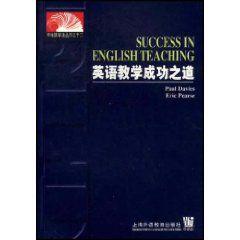內容簡介
《外語教學法叢書?英語教學成功之道》共分十二章。第一章闡述了英語教學的基本原理和必須注意的關鍵問題。第二章到第七章講述了課堂教學的各個步驟,如講解新的語言內容、組織學生操練、辭彙的教學和操練、發展耳聽會意和口頭交際的能力、發展閱讀理解和寫作的能力、複習鞏固階段的教學工作等。作者介紹了在實施以上各個教學步驟中的相關理論、有效策略和實例。第八章到第十一章涉及英語教學的其他方面,分別探討了教學計畫制訂與課堂管理,教材與教具的使用,評估與測試的實施等。本書的最後一章回顧了英語教學的發展,並提出了提高在職英語教師業務水平的幾種途徑,很值得借鑑與參考。本書的闡述深入淺出,富有啟發性。許多章節設有相關的任務和問題供讀者思考和討論。而附在每一章末尾的實踐方案更是起著畫龍點睛的作用,這些方案都緊扣每一章所陳述的主題,旨在指導英語教師把相關理論和教學方法套用到實踐中去。為方便讀者查詢,作者在書末提供了教學術語表,並列舉了一些相關的重要學術著作,供讀者進行深入的研究。
目錄
introduction.
1 a general approach to teaching english
introduction
recognizing success in teaching english
teachers and teaching
co-ordination of english language departments
establishing goals and objectives in teaching english
variations in course goals
communication first and last
english as the main classroom language
routine communicative activities
a general model of english teaching
creating conditions for learning
learner participation
motivation
summary
project
2 presenting new language items
introduction
new items in an english language course
.what you need to know about new items
functional-grammatical items
presenting new functional-grammatical items
teaching analysis and planning
presentation procedures
coursebook material
the place of writing in presentation
writing for clarification and consolidation
from presentation to practice
summary
project
3 organizing language practice
introduction
the difference between accuracy and fluency practice
practice and communication
oral accuracy practice
language patterns and substitution
accuracy practice and communication
information gaps
elicitation in accuracy practice
interactions
topics and activities
oral fluency practice
types of fluency activity
feedback and correction in oral practice
feedback and correction in accuracy work
feedback and correction in fluency work
written practice
summary
project
4 handling vocabulary
introduction
vocabulary in language teaching and learning
dealing with new vocabulary
meaning and use in communication
pronunciation and spelling
grammar
working on vocabulary
remedial work
summary
project
5 developing spoken communication skills
introduction
communication
communication outside the classroom
communication in the classroom
the four skills
listening
classroom listening
recorded texts
speaking
classroom speaking
speaking activities
summary
project
6 developing written communication skills
introduction
spoken and written language
reading comprehension
ways of reading
reading activities
reading outside the classroom
writing
writing activities
integrating skills
summary
project
7 review and remedial work
introduction
the need for review and remedial work
the language learning process
input, imitation, and cognitive hypotheses
subconscious and conscious processes
errors and learning
pedagogical and natural syllabuses
variables
implications for review and remedial work
review activities
remedial work
personalized remedial work
summary
project
8 planning and managing dasses
introduction
long-term planning
the course syllabus
syllabus units
short-term planning
work plans
lesson planning
class management
getting attention and participation
giving and checking instructions
managing pair and groupwork
teacher and learner roles
discipline
different teaching situations
children's courses
large groups
summary
project..
9 working with a coursebook
introduction
ways of using a coursebook
what coursebooks can offer
the syllabus
language presentation material
language practice material
skills development material
a sequence of work
recycling and review of language
additional material
what a coursebook cannot provide
preparing to use a new coursebook
exploiting a coursebook
using language presentation material
using language practice material
using skills development material
using review and clarification material
lesson planning around coursebook material
choosing a coursebook
summary
project
10 teaching aids and materials
introduction
different teaching contexts
using the board
writing and general organization
board drawing
designing and using prepared visual materials
wall-charts
cue-cards
real and imaginary objects
realia
mime and gesture
audio-cassettes
materials and activities
video
selecting material
summary
project
11 testing and evaluation
introduction
teaching, testing, and evaluation
teaching and testing
testing and evaluation
basic aspects of testing
types of test
validity and reliability
balancing validity and reliability
writing and evaluating achievement tests
comparing tests
test exercises and tasks
improving tests
evaluating learning, teaching, and courses
evaluating learning
evaluating teaching
evaluating courses
summary
project
12 development in teaching english
introduction
teachers and ways of teaching
approach and method
a survey 0fapproaches and methods
the grammar-translation method
the direct method
situational language teaching
the audiolingual method
alternative methods
communicative language teaching
the 'course design approach'
current developments
learner-centred teaching
task-based learning
developing as a teacher
self-development
co-operative development
formal development
summary
project a
project b
glossary
sources and further reading
index

